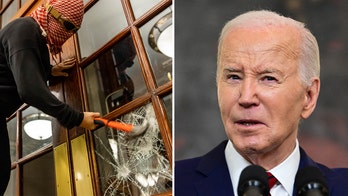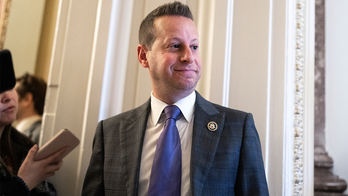CONAKRY, Guinea -- Guineans cast their ballot Sunday in a vote that has been delayed multiple times following violent ethnic clashes that pitted the nation's two largest ethnic groups against each other.
The ethnic divide between supporters of rival candidates Cellou Dalein Diallo and Alpha Conde has overshadowed what was supposed to be a historic ballot for the African nation of 10 million, which has never had a change of power through an election considered free and fair.
Election observers said voting was calm and that they had recorded only minor problems, including insufficient ballots in some precincts, said National Independent Electoral Commission President Siaka Toumani Sangare.
Many worry, however, that the country's simmering ethnic tensions will be put to the test in coming days once results are announced and it becomes clear that one of the candidates has lost, forcing that community to accept a president from an ethnicity other than their own.
"People say to themselves that the country is like a cake that is going to be divided. They think the only way to get a slice of the cake is if their ethnic group is in power," said poll worker Hamidou Soumah, who presided over the vote in a tiny store room in the Kaloum neighborhood of Conakry where people were snaking out the door.
Guinea -- a country so rich in minerals it is often referred to as a 'geological scandal' -- has been ruled by military strongmen for the past 26 years. They ran the country into the ground and it is now ranked as one of the poorest in the world despite its enormous reserves of bauxite, the raw material used to make aluminum, as well as diamonds and gold.
The country's fate appeared to have changed last year when the military agreed to step aside after the head of the junta was badly wounded in a shootout, forcing him to leave the country for emergency surgery.
The initial round of voting in June narrowed the field of 24 candidates to two, Diallo and Conde -- forcing the country to choose between a Peul and Malinke, the two largest ethnic groups.
Both Malinke and Peul voters say they fear that if their candidate does not win, their community will be excluded from the spoils of power.
Every election since Guinea declared independence from France in 1958 was rigged. The fraud was so overt that it was not uncommon for precincts to report more votes in favor of the ruling party than there were registered voters. For the first time there is no incumbent to sway the vote and the army has vowed to remain neutral, but Guineans have instead found themselves divided.
"When the army agreed to step down, we were handed a gift on a golden platter ... We need to seize this opportunity," said Rabiatou Serah Diallo, the president of the country's National Transition Council, who was also a longtime opponent of Guinea's last dictator. "This is the first time since independence that we are being given a chance to be free."
Clashes between Peul and Malinke supporters paralyzed Conakry for several days last month, and caused the vote to be rescheduled. The violence spread as far as Siguiri, a town 300 miles (500 kilometers) north of here, where at least 1,800 Peul fled their homes. Diallo told reporters Sunday that his party's representatives in the Siguiri area were too afraid to show up to monitor the vote, as required by electoral law.
"Lately, we have very much seen a kind of racial hatred -- a hatred and a violence founded on ethnicity. We cannot deny it," said 58-year-old Cellou Dalein Diallo just after he had finished voting. "Members of the Peul community have been chased out of their country. They were identified, beaten and stripped of their property ... It's the first time in the history of our country that we are seeing this type of violence directed at one community."
In the capital, minor disturbances were reported at a handful of polling stations, including some where voting materials arrived late or were incomplete. The most serious incident occurred abroad in the polling station in Madrid for expatriate Guineans living in Spain. Sangare, the election chief, said voters vandalized the polling area, causing the votes cast in that precinct to be canceled.
Bernard Kouchner, the foreign minister of France, Guinea's one-time colonial ruler, said in a statement that the vote appeared to have taken place "without major incident," and he hailed "a historic success after 50 years of dictatorship."
Many say they wish they could vote for the candidates based on their platforms and regret choosing along ethnic lines, but feel they need to do so to protect their community's interests.
"You shouldn't vote for a Peul because he's a Peul or a Malinke because he's a Malinke," said tailor Mamadou Bah, a Peul who said he's voting for the Peul candidate, Diallo. "I'd like to think I'm voting for him because of his ideas, but I'm mostly voting for him because the Malinke in my neighborhood are constantly insulting us," he said. "And we feel attacked."
The No. 2 of the military junta, Gen. Sekouba Konate, who agreed to allow the country to hold elections after junta leader, Capt. Moussa 'Dadis' Camara, was forced into exile, warned citizens in a televised speech that violence would not be tolerated.
"We know that violence is easy to spark and difficult to put an end to. Better we don't start at all," he told voters on the eve of the ballot. "The time has come to make a clean break with a past of violence, of disorder, of chaos, of rivalry, of hatred."
Guinea's recent past has been especially dark. In 2009, Camara's presidential guard sealed the exits to the national soccer stadium where tens of thousands of protesters had gathered to demand an end to army rule. They then opened fire into the trapped crowd. Women that escaped were hunted down and gang raped by soldiers on the stadium turf.
Under Konate, the army has received human rights training, but the military remains a threat.
When Konate arrived to cast his vote he was surrounded by a net of beefy soldiers who beat back reporters and voters.
A group of children gathered on the street to watch, and one of his bodyguards pointed his Kalashnikov at them. A woman complained, telling him to put down his gun and he shoved her to the ground, causing her to hit her shoulder on the pavement, said witnesses.
"We're sick of being ruled by the military," said 19-year-old Oumou Toure, the woman's niece. "They're psychopaths. They're not normal. I wonder if they'll really give over power to civilians when this vote is over."
Nearby at the Kaloum poling station, poll worker Soumah said the ethnic question is a distraction considering what Guinea could gain if the vote is transparent. By closing time, they had checked off the names of most of the 556 registered voters and their ballots had been folded and placed inside a Tupperware container.
On the denuded plaster wall, a picture of Camara, the country's last military boss, hung askew in a plastic frame. Nodding toward the picture, he said: "After today, it's over. As soon as we finish voting, we are taking that picture down."




